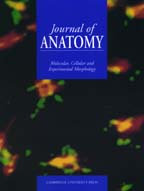No CrossRef data available.
Article contents
Posterolateral tunnels and ponticuli in human atlas vertebrae
Published online by Cambridge University Press: 24 August 2001
Abstract
The posterolateral tunnel on the superior surface of the first cervical (atlas) vertebra is of normal occurrence in monkeys and other lower animals, but its presence in the form of a tunnel-like canal, for the passage of the third part of the vertebral artery over the posterior arch of the human atlas vertebra is not reported. The aim of the present study was to detect the presence of such a canal, in addition to other types of ponticuli (little bridges) reported by earlier investigators, in macerated atlas vertebrae and routine cadaveric dissections. The posterolateral tunnel was detected in 1.14%, and the posterior and lateral ponticuli in 6.57 and 2% of vertebrae. Probably the bony roof of the posterolateral tunnel serves the purpose of additional lateral extension for the attachment of the posterior atlanto-occipital membrane in quadrupeds, where the load of the head is supported by the extensor muscles of the neck, ligaments and posterior atlanto-occipital membrane. In man, where the weight of the head is borne by the vertical loading of the superior articular process of the atlas, the roof of the tunnel has disappeared.
Keywords
- Type
- Short Report
- Information
- Copyright
- © Anatomical Society of Great Britain and Ireland 2001


